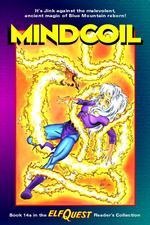

| Elfquest: Mindcoil. Written by John Ostrander with Wendy Pini. Illustrated by Dennis Fujitake and others. Poughkeepsie, NY: Warp Graphics, 1999. 1v. (unpaged). (Elfquest Reader's Collection, Book 14a). $11.95. ISBN 0-936861-50-9. |

|
GENRES: AUDIENCE: SYNOPSIS: Having helped avert war with the Neverending, a reptilian alien race, Kullyn is now charged with escorting Firstborn Newbreed, a member of that race specially bred to be able to tolerate the presence of humans. Because he's too truthful, Firstborn manages to create friction between Kullyn and Tamia and, later, between Kullyn and Jink. Elsewhere, Jerrod and his fellow Black Snake Belroyd attempt to channel the lurking power in the ruins of Blue Mountain. Although Jink chases them away, Jerrod is determined to get that power for himself, so he marshalls the other three Black Snakes of his generation. Successfully evading the older-generation Black Snakes, as power-hungry as Jerrod but not as reckless, the five travel to Blue Mountain. The older Black Snakes, trying to find out what the younger generation is up to, plant a suggestion in Kullyn to travel to Blue Mountain. However, when he stumbles on the five younger Black Snakes, they employ him as a focus for their mental energy. His mental scream alerts Jink, who had been having a confrontation with Tamia that has started to turn into friendship. The two women steal a skimmer and go in pursuit. Unfortunately, Jerrod has managed to contact the power--which has been hungry for an identity of its own. It takes him and the other Black Snakes over to become the serpentine energy being Mindcoil. It sends out an enormous pulse of mental energy that sucks in the minds of every intelligent being it meets, giving them terrible waking dreams. Only with the help of the mysterious caretaker of Blue Mountain is Jink able to break free of the creature's grip. But it's just her, Tamia, the caretaker, and Firstborn Newbreed against an entity capable of absorbing and controlling the minds of half a continent.... EVALUATION: The dialogue is usually good--I particularly liked Firstborn Newbreed and his interesting speech patterns--but I wondered why the Black Snakes kept referring to each other by their full names, which seemed awkward and unnatural. The plot moves along speedily--in places a bit too speedily, notably when Tamia and Jink have their argument and, all of a sudden, Tamia crumples in tears from what seemed like a very mild insult by Jink; similarly, it takes just a few lines from Jink to make her feel better. Wish I could go through sobbing fits that quickly! I think what left me most dissatisfied with the book was the superhero/superficial nature of Mindcoil and its attack. We've seen zillions of plots where some force takes over the minds of millions, brings up guilt-making memories/dreams, then is defeated to leave its victims mostly untouched except for vague memories and the like. I expected something more original from Elfquest, and from Ostrander, one of my favorite comics writers. But the SF branch of the series, with its emphasis on humans rather than elves and its less-than-epic stories, has been consistently inferior to the elf-centered books. Maybe the presence of the elves (with their strong personalities if nothing else) adds a measure of originality to otherwise standard plots--or maybe it's just easier to care about those characters and their problems. Consider the Wolfriders, who, though individually superior to humans in nearly every way, have to struggle constantly to survive because the humans have one overpowering advantage: numbers. This struggle has sustained Elfquest for decades, keeping it fresh. But when elves start to move freely in human society, like Jink (or Rayek, in Rogue's Curse), they become just superior humans (or, god forbid, superheroes), and there's nothing particularly original about that. Nothing wrong with the art, though; Fujitake is one of my all-time favorites. The first chapter in the story is mostly by other people, and (aside from having been color art reproduced in black-and-white for this book) it's clunky and rather dull, with a lot of head shots and not much in the way of backgrounds. Fujitake's art displays a much better sense of drama and a superior cinematic feel, as can be seen below:
Like the other Elfquest SF books, this one is a minor acquisition, part of a comprehensive Elfquest collection but not a necessity. I do think there are appropriate SF-themed stories to tell in this universe, but no one's found the right formula yet. |
Return to Rational Magic Home
